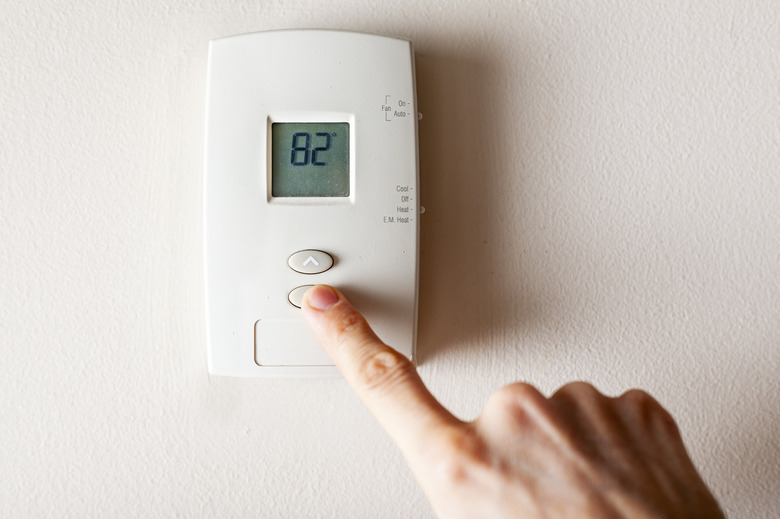Why Is My House Hot If The AC Is Blowing Cool Air?
We may receive a commission on purchases made from links.
If your house seems uncomfortably warm even with the air conditioner on and if the air coming from the registers is cool, you'll have to investigate to figure out the problem. Even if the AC is blowing cool air, it is possible for your home to be hot due to other factors, including the hot sun, improper ventilation, dirty filters and insufficient air circulation in the rooms.
Tip
Even if the air conditioner is blowing cool air, other factors, including extreme heat outside and lack of air circulation, can affect the temperature inside your house.
Lack of Shading
Lack of Shading
Some rooms in your house may be hard to cool because of a lack of shading. This is particularly true if a room has an abundance of windows in it. The sun shines through the windows and heats the room. Even if your air conditioner is working as hard as it can, a brightly sunlit room in the summer can still be hot.
Blocking the sun from the windows is the best solution to improving the unit's ability to cool the room. Cover windows with drapes or blackout curtains. Consider planting shade trees or installing awnings over the windows to block the sun's rays.
Wrong Size Air Conditioner
Wrong Size Air Conditioner
Many air conditioners are installed without proper consideration for the correct size of the unit or BTU output. The wrong size unit, especially one that produces too many BTUs, may cool the air but be unable to eliminate the humidity from the air. You may feel clammy or sweaty as a result, as the air conditioner will be unable to dry out the air enough to make it comfortable.
Leaky Air Conditioning Ducts
Leaky Air Conditioning Ducts
Your home may feel hot because not all of the cooled air is reaching the rooms. A leaky duct system could allow the cold air to escape to the outdoors or between walls. Closing the registers in unused rooms can also affect the overall cooling of the house, increasing pressure in the ducting and forcing the cooled air through the leaks.
While you may be able to feel cool air coming from the vents, most of it may not be reaching the interior of the house. Harder-to-cool areas become warmer than they should be and the air conditioner works harder, resulting in higher energy bills.
Improper Ventilation Inside
Improper Ventilation Inside
Improper ventilation can trap too much hot air in the home, which can make part of your house hot even when the air is on. This is especially true for upper floors. Heat rises, and cool air stays lower.
If vents in the attic are not sufficient in releasing the rising hot air, it will become trapped inside the house and result in partial cooling or cooling that will take much longer than average. Also, a downstairs thermostat may detect that the temperature is cool enough and shut off while it's still hot upstairs.
Lack of Air Circulation
Lack of Air Circulation
Portable fans and ceiling fans help push the cool air around in the room. Pushing hot air down by using ceiling fans and increasing air circulation with box and/or oscillating fans mixes the warm and cool air, making the entire room and house more comfortable.
Also, when cooking or showering, use the exhaust fans to pull moisture and heat out of the house. When cooking, try using a slow cooker rather than the oven to reduce the extra heat generated in the kitchen.
Maintenance of Air Conditioning Systems
Maintenance of Air Conditioning Systems
Whether a window, wall or central air conditioning system, regular maintenance helps improve performance as well as extend the life of your cooling systems. Change or clean the filters monthly or every other month. Remove debris; then wash off the exterior and coils using a mild dishwashing liquid and rinsing with water. Allow to air-dry.
If your air conditioner is not able to cool the entire house, consider calling a heating and air conditioning technician to check your system. There may be a blockage in the ducting or an issue with the coolant. Relocating the thermostat may be an option; if it is located too close to an air conditioning register, it may turn off prematurely, before the house reaches a comfortable temperature.
